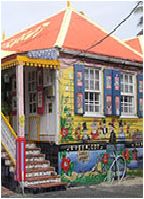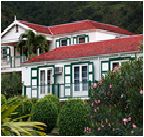
The Caribbean is well known for its beautiful beaches, idyllic scenery, as a playground of the rich and famous. The luxury rental market for short-term accommodation is a multi-billion industry. Rules and regulations are generally favourable to businessmen, giving sufficient protection to the rights and interests of landlords and hotel-owners.
However, the same cannot be said about the local rental market. In several countries, there is rent control, reducing the landlord’s incentives to provide rental housing. Some countries have very restrictive rental systems.
In some countries, it is very difficult to evict non-paying tenants. In particular, the Dominican Republic, Guadeloupe and the French Caribbean, and the St. Vincent and Grenadines can be described as strongly pro-tenant. In addition, the Dominican Republic forbids security deposits. In the US Virgin Islands, rents are frozen to its 1947 level.
Ironic as it may sound, a “pro-tenant” rental market is actually harmful to tenants in the long run. It discourages landlords from investing in new rental units, leading to less supply. As demand for rental units increases with population growth, shortages develop. Landlords lose the incentive to maintain and upgrade their rental units. The quality of the existing rental housing stock deteriorates. Landlords may turn to illegal measures such as key deposit to recover their investments.
In this article, the Global Property Guide surveys the rental markets of Caribbean economies. They are examined in terms of rent control, security deposits and tenant eviction. Each economy is rated as strongly pro-tenant, pro-tenant, neutral, pro-landlord or strongly pro-landlord (see Table 1).
The ratings are based on research by the Global Property Guide based on each country’s laws and media reports about the application of each law. As much as possible, contributions from law firms operating in each country have been incorporated (see list of Contributing Law Firms).
Table 1. LANDLORD - TENANT RELATIONS |
|||
| COUNTRY | RATING * | RENT CONTROL | SECURITY DEPOSIT |
| Anguilla | Pro-Landlord | None (unenforced) | 1 month's rent |
| Aruba | Pro-Tenant | Yes; but not followed in practice | no legal limit |
| Bahamas | Pro-Landlord | Yes; but almost ineffectual | normally 2 months' rent |
| Barbados | Neutral | None | no legal limit |
| Belize | Pro-Landlord | Yes, rent increase limited to 10% | 2 months' rent |
| Bermuda | Pro-Landlord | Yes, for units with ARV below BM$16,000 | for rent controlled units: 2 weeks rent or BM$100, whichever is higher |
| Cayman Is. | Pro-Landlord | None | 1 month security deposit; 1 month advance rent |
| Dominica | Pro-Landlord | Yes, for units with monthly rent below EC$800 (US$300) | normally 1 - 3 months' rent |
| Dominican Republic | Strongly Pro-Tenant | Yes, monthly rent fixed at 1% of property value | |
| Grenada | Neutral | Yes, but largely unused | no legal limit |
| Guadeloupe | Strongly Pro-Tenant | Yes, rent adjustment is tied to the INSEE construction cost index | 2 months' rent |
| Jamaica | Pro-Tenant | Yes, annual rent is 7.5% of assessed value | illegal to collect |
| Netherlands Antilles | Pro-Tenant | None | normally 1 - 2 months' rent for rental of 1 year |
| Puerto Rico | Pro-Tenant | None | usually 1 month's rent |
| St. Kitts & Nevis | Pro-Landlord | None | 1 month security deposit |
| St. Vincent & Grenadines | Strongly Pro-Tenant | None | usually 1 month's rent |
| Trinidad and Tobago | Pro-Tenant | Yes, rent adjustment is subject to approval of government | no legal limit |
| Turks & Caicos Is. | Pro-Landlord | None | normally 1 - 3 months' rent |
| US Virgin Is. | Pro-Tenant | Yes, rents frozen to 1947 level or to the first rent charged | 1 month security deposit; 2 months advance rent |
| * Click here for a more detailed discussion of our Landlord-Tenant Rating System. Source: Global Property Guide, Contributing Law Firms |
|||
A. Rent Control

Rent controls distort incentives faced by landlords and tenants, and lead to the underdevelopment of rental markets (Basu and Emerson, 2000). Fortunately, rent controls only affect a small number of Caribbean countries. However, three countries have very restrictive systems – the US Virgin Islands, Jamaica and the Dominican Republic.
The most restrictive is the US Virgin Islands. Rents are frozen at their 1947 level. For housing accommodations, the maximum rent ceiling is the rent in force and in effect on July 1, 1947. For buildings created and/or rented after July 1, 1947, the maximum rent allowed is the first rent charged for the unit.
In Jamaica, the Rent Assessment Board sets the rental for all commercial and residential premises. Theannual rent ceiling is 7.5% of the assessed value of the premises.
In the Dominican Republic, there is a universal rent control with the maximum monthly rent fixed at 1% of the value of the rental property, in effect, 12% annual rental returns.
Other Caribbean countries’ rent controls have minor effects only. In Belize, initial rents can be freely negotiated, but rent increases are limited to 10% annually or to a prescribed level. The 10% limit is acceptable, given that the average annual inflation for the past ten years has been below 2%.
In Guadeloupe and the French Caribbean, the initial rent can be freely agreed between the owner and the renter. However, the rent can be revised only once a year, and only if a clause in the contract (carefully drafted) specifies it. The increase cannot be above the increase of the four-quarterly average of the National Institute for Statistics and Economic Studies (INSEE) index of construction costs. Index clauses and periodic clauses must comply with this.
In Trinidad and Tobago, only rent adjustments are subject to control.Under the Rent Restriction Act, rent adjustments for covered dwelling houses are subject to the approval of Rent Assessment Board. Either the landlord or the tenant may apply for a review of rent. Furnished dwelling houses with a monthly rent of TT$1,000 (US$161.29) or less are subject to rent restriction. Unfurnished dwellings with a monthly rent of TT$1,500 (US$241.93) are likewise covered.
Three countries have almost ineffective rent control systems. In Dominica, the Tenancies and Rent Control Act is extremely favorable to tenants, but applies only to dwelling houses where the rent is less than $800 (US$300) per month. In the Bahamas, the rent Control Act limits applies to dwellings with a total value less than B$25,000 (B$1=US$1) says law firm Glinton, Sweeting, O'brien. However, no house now in the Bahamas is worth less than B$25,000. In Aruba, despite a mandated rule on rent determination, most landlords in practice do not turn to the Rent Assessment Advisory Committee to determine the rent. They tend enter into agreements with tenants and determine the rent with mutual consent.
B. Security Deposits
 In most countries and territories in the Caribbean, security deposits range from 1 to 3 months’ rent for a one year rental agreement (see Table 1). In several cases, there are no legal limits on the amount of security deposits and advance payments.
In most countries and territories in the Caribbean, security deposits range from 1 to 3 months’ rent for a one year rental agreement (see Table 1). In several cases, there are no legal limits on the amount of security deposits and advance payments.
However Jamaica and the Dominican Republic have restrictive rules. In Jamaica, it is illegal to require a deposit. If the landlord has required one, the tenant may recover such payment. However, the Rent Board has announced amendments to the rent law, including the provision for payment of security deposits. In the Dominican Republic, the law mandates that the security deposit should be paid into Banco Agricola (Agricultural Bank) and returned without interest after an amount for repairs has been deducted. In reality, however, nobody puts security deposits in banks and very few landlords return the deposit. Most of the time, the tenant uses the deposit to pay the last months of the tenancy.
C. Tenant Eviction
Evicting tenants is a serious problem in some parts of the Caribbean. In the Dominican Republic, tenants get more or less perpetual security. However in other countries eviction can take months or even years, because tenants are given time to look for alternative dwellings. In many other Caribbean countries, the court systems are cumbersome and inefficient.
Eviction is most problematic in the Dominican Republic. Rental agreements normally last for three to six months. However, even if the contract has already expired, the tenant can continue living in the unit as long as rent is paid. If the landlord refuses to accept the rent, the tenant can simply deposit the amount Banco Agricola. The bank will hold the amount for the landlord and the tenant can stay in perpetuity.
Tenants can only be evicted on six grounds in the Dominican Republic: (1) failure to pay rent, (2) misuse of the property, (3) subletting (if prohibited by contract), (4) changing the structure of the premises, (5) repairs or reconstruction and (6) if the owner intends to inhabit the property for at least two years.
It is not easy to evict a tenant even if the ground is that the landlord intends to use the property for personal reasons. A hearing must be conducted and the tenant is usually given months, or even years, to look for an affordable alternative dwelling. Eviction on other grounds is even more cumbersome and difficult. In addition, eviction even for failure to pay rent usually takes five months or more according to law firm Guzman Ariza.
The law in St. Vincent and the Grenadines generously protects the tenant. Prior to eviction, the tenant is given at least six months to look for an alternative dwelling, according to law firm Knights Chambers.
In the US Virgin Islands, a tenancy may be terminated for nonpayment of rent with at least 14 days’ notice. For reasons other than rent default, the landlord is required to give a 30-day notice and apply for a court approval prior to evicting the tenant. If the landlord is given the right to recover the premises, the tenant may delay the eviction up to 6 months only. This is to give the tenant ample time to look for another unit of housing. The tenant must pay the rent for the court-granted extension.
In Arubathe landlord may start summary proceedings to obtain an eviction judgment, which will take approximately 2 to 6 weeks. However, to dissolve an existing tenancy agreement, proceedings may last approximately one year, according to law firm VanEps Kunneman VanDoorne.
In Guadeloupe and the rest of the French Caribbean, the tenant can rarely be evicted before the term ends. Otherwise, even for non-payment of rent, the landlord has to wait till the end of the term. Notice must be sent at least six months before the end of the term, and complex conditions must be complied with. Even then, the process will take between six months to a year and a half from the end of the contract.
However in Dominica, a tenant who thinks he has no defense to a claim for possession would normally vacate upon commencement of eviction proceedings. The tenant can hold out, but run the risk of incurring unnecessary legal costs. Law firm Alick Lawrence Chambers notes that fortunately (or unfortunately), in a small country such as Dominica, where everyone knows each other, it does do a tenant no good to develop a reputation of being litigious.
 A study by Djankov et. al. (2002) estimates how many days it takes on average to evict a non-paying tenant. To make the case simple, it is assumed that the landlord has all the legal reasons to evict the tenant. It is also assumed that all formal channels are used, including courts.
A study by Djankov et. al. (2002) estimates how many days it takes on average to evict a non-paying tenant. To make the case simple, it is assumed that the landlord has all the legal reasons to evict the tenant. It is also assumed that all formal channels are used, including courts.
The eviction process is divided into three phases; the duration of completion of service, the duration of trial, and the duration of enforcement. Eviction of tenant is fastest in Bermuda at only 50 days (see Chart 2). However, in the Dominican Republic and Guadeloupe, it takes more than 200 days to evict tenants (Djankov et. al., 2002).
Enforcement problems
Because Caribbean legal systems tend to be extremely favorable to tenants, landlords often resort to illegal means to evict tenants and collect unpaid rent. For instance in the Netherlands Antilles, even though there are broad legal provisions on landlord and tenant relations, they are not commonly followed. Landlords typically use intimidation to evict tenants and recover arrears.
Consequences
Three Caribbean countries strongly control rents – the US Virgin Islands, Jamaica and the Dominican Republic. Jamaica forbids security deposits. There are strongly pro-tenant systems in the Dominican Republic, Guadeloupe and the French Caribbean, giving tenants strong security of tenure.
Our view is that free rental markets, with adequate incentives for landlords to provide housing, tend best to encourage strong and active rental markets. In the Caribbean, most housing projects focus on the direct provision of housing units with limited and, at times, dismal results. The misplaced focus on direct housing provision, long ago abandoned in Europe, is still in force in several countries.
By removing restrictions, most notably in the Dominican Republic and the US Virgin Islands, the rental market for local tenants could be developed, improving living standards.